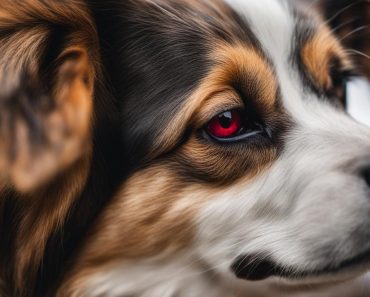As a devoted pet owner, nothing sends a shock of worry through me faster than noticing my dog’s face swollen on one side. Suddenly, a flurry of questions buzz through my mind – “why is my dog’s snout swollen?”, “what could cause my dog to have a swollen face?”, and “is this swelling a sign of a dog swollen jaw or something else?”. These concerns press upon me the need to understand the possible health issues affecting my canine friend and to seek the appropriate care swiftly. The sight of my dog with a half-puffed face reminds me that our pets are vulnerable and depend on us to spot these signs of distress early on.
From allergies that suddenly manifest to underlying dental issues, the reasons for a dog face swelling are diverse, each requiring a unique solution. Identifying the correct source and treatment is not just about relief—it could very well be a life-saving decision. Now, presented with this lopsided expression gazing back at me, it’s clear that action must be taken, and knowledge, as they say, is the first step to recovery.
Key Takeaways
- Recognize symptoms of one-sided facial swelling in dogs immediately for timely action.
- Differentiate between various causes such as allergies, dental woes, or abscesses.
- Understand that quick, accurate diagnosis can greatly influence treatment effectiveness.
- The importance of veterinarian consultations cannot be overstated when faced with canine facial swelling.
- Being prepared to manage potential allergies can mitigate risk and ensure the well-being of my dog.
Understanding Unilateral Facial Swelling in Dogs
As a dog owner, nothing’s more disconcerting than noticing something amiss with my furry companion’s health. Recently, I learned about unilateral facial swelling in dogs—a concerning condition that could catch any pet parent off guard. Understanding what this condition entails and recognizing the critical signs can help in managing my dog’s health effectively.
What is Unilateral Facial Swelling?
When my dog presents with a swollen cheek, it could be a classic case of unilateral facial swelling. This condition results in one side of their face puffing up, often unexpectedly. It might be easy to spot but determining the cause requires veterinary insight. Unilateral dog facial swelling could range from a simple insect sting that I might dismiss as harmless, to something more serious requiring immediate attention.
Recognizing the Signs and Symptoms
Some dog facial swelling symptoms are easier to spot than others. Along with the obvious lopsided appearance, I should also watch out for symptoms including:
- Excessive drooling or salivation
- Apparent pain or discomfort when eating or touched
- Difficulty in breathing or noisy respiration
- A dog swollen cheek that’s warm to the touch
- Discoloration of the gums, hinting at possible underlying issues.
It’s essential that I don’t dismiss these signs as my dog relying on me to interpret and act on these health signals is crucial.
The Importance of Prompt Veterinary Care
Seeking prompt veterinary care is paramount when dealing with any aspect of canine facial swelling. A quick response can mean the difference between a simple treatment and a life-threatening situation. It could be an acute allergic reaction where an emergency dose of epinephrine saves my dog’s life or an early diagnosis of a more grave condition giving my pet the best chance at a full recovery. Consistently monitoring and having a keen eye can prevent major health complications and ensure my dog’s well-being.
Common Culprits Behind Canine Facial Swelling
As an attentive dog owner, discovering sudden facial swelling in my beloved pet can be quite unsettling. To determine what’s causing the facial swelling in dogs, it’s critical to explore common conditions that could be at play. One of the first things I watch for is dog swollen eye or dog facial inflammation, key indicators that something is amiss.
- Allergies: They can strike at any moment and originate from a variety of sources, such as certain foods, environmental factors, or unexpected reactions to medications. Inflammatory responses to allergens are among the top dog facial swelling causes.
- Insect Bites or Stings: A single bite from an insect can result in a dramatic reaction, causing rapid swelling. My dog’s face, especially around the eyes or mouth, can swell almost instantly.
- Abscesses: These are often secondary to encounters with other animals or accidental injuries that break the skin. The infection that ensues can lead to a painful, swollen area on my dog’s face or jaw.
- Tumors: Although less common, growths both benign and malignant can manifest as dog one-sided facial swelling. This slow-developing condition requires immediate veterinary intervention.
No matter the cause, if I observe any signs of dog facial inflammation or swelling, I understand the need for prompt action. Keeping a keen eye on symptoms and behaviors is paramount to addressing the underlying issues effectively.

Whether it’s a classic case of an allergic reaction or something more serious, identifying the cause behind my dog’s discomfort is essential. By being aware of potential risks and quickly seeking professional advice, I can make sure my pet receives the care and attention needed to recover from facial swelling. In the end, understanding these culprits allows me, as an owner, to be better prepared for future incidents and maintain the health and happiness of my cuddly companion.
Allergies as a Primary Cause for Dog Swollen Face One Side
When I observe a swollen muzzle on my canine friend, with puffiness concentrated on one side of the face, my mind immediately turns to allergies as a potential culprit. Being armed with knowledge about allergies can help me identify what’s troubling my pet quickly and seek prompt dog facial swelling treatment.
Identifying Allergens
Allergies can manifest in many forms, from visible swollen jowls in dogs to severe face edema. I need to keep a watchful eye on potential allergens, which could be anything from the food they eat to the plants they may brush against during their outdoor adventures. Noticing which side of my dog’s face is swollen—whether it’s the muzzle or even a swollen mouth—helps pinpoint the allergen exposure area and could guide me toward the cause.
Allergic Reaction Treatment Options
In handling my dog’s allergic reactions, various treatments are available. If the allergy has led to dog swollen muzzle on one side, I know the first step is to remove the source of the allergen if possible. From there, options may include over-the-counter antihistamines, prescription steroids, or in critical cases, administering epinephrine. For swollen jowls dog situations that stem from food allergies, a change in diet may also be recommended. Continuous monitoring and partnering with my vet ensure the proper treatment path is followed, keeping my furry best friend safe and comfortable.
Infections Leading to a Dog’s Swollen Cheek or Face
When my dog shows signs of a swollen cheek or displays puffiness on one side of the face, it’s often a red flag that points to an underlying infection. Initially, I may notice some redness or my pet showing signs of discomfort, which prompts me to investigate. It can be alarming to see conditions such as a boxer swollen face or my dog’s face swollen on one side under the eye – which are clear signs that immediate veterinary attention is necessary.
Skin and Dental Abscesses
Infections such as dog facial abscesses can be the culprits behind the swelling. These abscesses may result from something as simple as a skirmish with another animal or a hidden dental issue. Symptoms like a dog’s nose swollen on one side might indicate an abscess beneath the surface that’s causing the distress. Abscesses don’t just go away on their own; they require a vet’s intervention often involving antibiotics and sometimes surgery to treat the root cause effectively.
Cellulitis Explained
Cellulitis, another type of infection, can result from any puncture wound or when a seemingly minor dog facial injury gets infected. The site becomes warm, swollen, and painful. Treating cellulitis may include a course of antibiotics and careful cleaning of the affected area. If I notice these signs, I know it’s time for professional medical care to prevent more serious health concerns, which could jeopardize my beloved pet’s well-being.
FAQ
What could be causing my dog’s swollen face on one side?
There are several reasons why your dog might have a swollen face on one side. Potential causes include allergic reactions to substances like food, insect bites, or medications; dental problems such as infected teeth or gum disease; abscesses resulting from bites or wounds; and more serious conditions like tumors or growths. Observing any additional symptoms can help pinpoint the cause, but a vet’s diagnosis is essential.
How can I tell if my dog’s swollen face is due to an allergic reaction?
Allergic reactions often cause rapid swelling, which might be accompanied by signs like itching, redness, hives, or difficulty breathing. Allergens could be anything from food to environmental factors or insect stings. If you notice your dog’s face is suddenly swollen, especially after eating or being outside, an allergy could be the culprit. Seek immediate veterinary attention as some allergic reactions are severe.
What should I do if I notice unilateral facial swelling in my dog?
If you spot swelling on one side of your dog’s face, it’s important to respond quickly. Check for any other symptoms that could indicate the severity of the condition, such as trouble breathing, changes in gum color, or signs of pain. Remove any potential allergens from the environment and contact your veterinarian immediately, as timely intervention is often vital.
What treatment options are available for a dog’s one-sided facial swelling?
Treatment for your dog’s swollen face will largely depend on the underlying cause. For allergic reactions, antihistamines or steroids may be prescribed. Abscesses might require antibiotics and possibly drainage. Dental issues could necessitate tooth extraction or special dental care. In any case, pain relief and anti-inflammatory medications are often part of the treatment regimen. Your vet will provide the best course of action based on their diagnosis.
Can dog facial swelling be prevented?
While you can’t prevent every instance of dog facial swelling, there are steps you can take to minimize the risks. Regular dental check-ups can preempt dental issues, while keeping your home and yard free from allergens and hazards can help prevent allergic reactions and injuries. Familiarizing yourself with your dog’s normal behavior and health status also enables you to notice any anomalies early, ensuring quicker response times in case of emergencies.
Are there any home remedies for a dog’s swollen face?
It is crucial to first identify the cause of the swelling before attempting any home remedies, and always collaborate with your veterinarian before giving any treatments at home. Depending on the cause and severity, your vet might recommend cold compresses to reduce swelling or over-the-counter antihistamines if the swelling is due to allergies. However, if the swelling is due to infection or another serious cause, home remedies are not a substitute for professional treatment.
Why is prompt veterinary care important for unilateral dog facial swelling?
Immediate veterinary care is essential for unilateral dog facial swelling as it could indicate a serious and potentially life-threatening condition. Quick action is especially critical if the swelling is due to an obstruction of the airways, a severe infection, or a toxic reaction. Even in less severe cases, early professional intervention can lead to a more effective treatment, less discomfort for your dog, and a quicker recovery.
What are the symptoms that indicate my dog’s swollen face requires emergency care?
Seek emergency veterinary care if your dog’s swollen face is accompanied by difficulty breathing, excessive drooling, significant pain, fainting, seizures, or if the swelling is extending to the throat and causing difficulty swallowing. A significant change in behavior, such as increased agitation or lethargy, may also warrant immediate attention. These symptoms could signal a severe allergic reaction or other urgent health issues.






